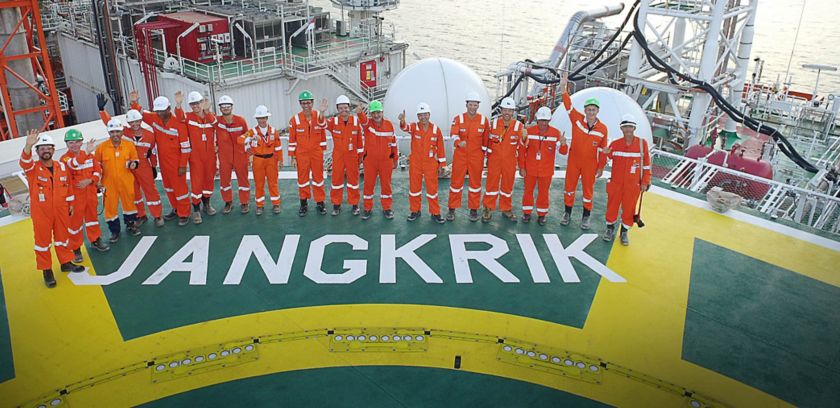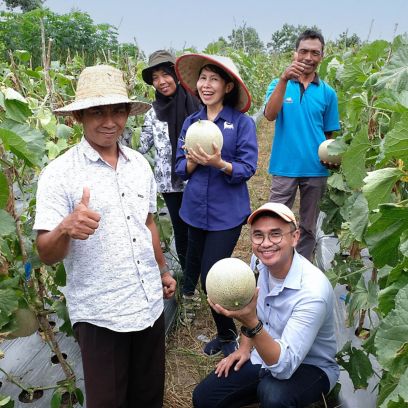Type of activity
Liquid natural gas (LNG)
Oil & Gas
Economic diversification
Community health
Territory protection

We operate in Indonesia in the exploration, production and development of hydrocarbons, both onshore and offshore, with a NewCo with PETRONAS, a strategic collaboration in line with the principles of our satellite model. Among the most significant initiatives, gas production from the Jangkrik field and the development of Merakes, located in the deep waters of East Kalimantan, make a significant contribution to increasing gas availability for the domestic energy market and for export. Integration with existing infrastructure enables the optimisation of lead time and operating costs. The combination of assets plays a central role in the expanding liquefied natural gas (LNG) sector in the Asia Pacific region, a context marked by growing energy demand and progressive improvements in access to energy. In this scenario, international partnerships focused on emissions reduction and environmental sustainability are key levers to support the energy transition.
Activity start date: 2001 – present
Thanks to a diversified portfolio of assets across the exploration, development and production phases, we operate in the country in business combination with PETRONAS, both onshore and offshore, with an established presence in the liquefied natural gas (LNG) sector. We hold interests in 12 production sharing contracts (PSCs), nine of which are in deep waters. The exploration campaign conducted offshore East Kalimantan led to the start-up of production from the Jangkrik and Merakes projects. The proximity of the two fields allows us to maximise the use of existing infrastructure, optimising development costs and timelines. The development of the Geng North and Gehem fields will contribute to the creation of the new Northern Hub production centre in the Kutei Basin. The acquisitions of strategic assets from Chevron and Neptune, further strengthen our position in the area, in line with Eni’s energy transition strategy to increase the share of natural gas to 60% of the production mix by 2030.
Ensuring drinking water for the Muara Jawa and Samboja districts in East Kalimantan is the goal of one of our programmes. We supply water to around 1,600 people by drilling wells. In Samboja we support the local community with projects aimed at promoting training in agriculture, the area's main livelihood, and combating the heaping of waste in backyards.
We also run programmes aimed at strengthening the local economy by supporting improvements in the quality of products from micro, small and medium-sized enterprises, and by promoting digital literacy training programmes that foster inclusion and the development of key skills for the future.
From the first LNG shipment to agreements for international cooperation, we share the country's journey towards the energy transition.
Eni announces a significant gas discovery in the Kutei Basin, further validating the effectiveness of its near-field exploration strategy in the area.
NewCo with PETRONAS established to integrate assets in Indonesia and Malaysia.
Framework agreement signed with PETRONAS to combine activities in Malaysia and Indonesia.
The project in the Kutei Basin marks a milestone for Eni: the well started production within 2 years, leveraging offshore resources with a fast-track development model.
The new joint venture with PETRONAS will create significant growth opportunities in Malaysia and Indonesia, potentially becoming a leading operator in the LNG sector in the region.
The integrated development of the two fields will create the Northern Hub production centre.
The meeting focused on the planned initiatives for the energy transition and decarbonization and the consolidation of Eni’s position in the Kutei Basin following the acquisition of Neptune.
Eni announces an important gas discovery, approximately 85 km away from the east coast of Kalimantan.
Eni ensures greater flexibility and further diversifies its LNG supplies by strengthening its presence in the growing markets of South Asia and the Far East.
Eni announces the acquisition of Chevron's interests in the Kutei basin, East Kalimantan.
The Memorandum of Understanding signed by Eni and SKK Migas represents an international recognition of our technological resources.
Located 16 kilometres south-east of the floating production unit in Jangkrik, it is a valuable accomplishment in the country following the start of production at Merakes.
The field, located in the deep waters of the Makassar Strait, consists of five subsea wells that will produce 13 million m³ of gas per day.
The Energy Ministry approves the programme for the oil field in Indonesia's offshore.
The 22,500 m³ load produced by the field is destined for the country's domestic market.
The gas produced in deep waters is destined for the Botang liquefaction plant.
Eni began its activities in the country in 2001. It currently operates in the areas of exploration, production and development.

The project overcame the challenge of quickly building all the gas process modules into one large integrated module.

We develop projects to ensure access to drinking water and agricultural training, supporting quality of life and the environment.